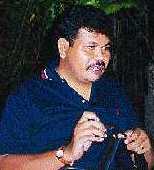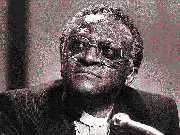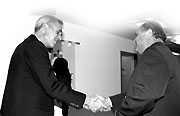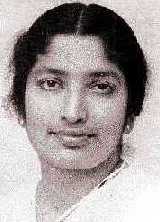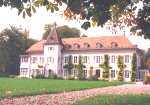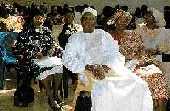- General Secretary visits Cuba
- Science and Religion work together in Armenia
- Finding the truth in the Pacific
- Political moves in Indonesia
- East Timor pastor escapes death
- Archbishop Tutu on the debt crisis
- New WTO head visits WCC
- Endowment honours first woman WCC president
- The long conflict in Sri Lanka
- Critical comments in Czech Republic
- Urgent appeals from Sierra Leone
- WCC visits divided Cyprus
- Endowment for Ecumenical Institute
- General Secretary's Christmas message
- Recent WCC resources
- Recent WCC publications
A visit to Cuba by a WCC delegation led by the general secretary, the Rev. Dr Konrad Raiser, featured a meeting with President Fidel Castro that lasted for more than four hours. Their conversation ended at three in the morning after dinner at the massive headquarters of the government’s council of state in Havana. Discussion with the 73-year-old ruler ranged over a wide variety of topics, from the thinking of St Thomas Aquinas to the problem of foreign debt.
Dr Konrad Raiser with Cardinal Jamie Ortega,
In common with the National Council of the Churches of Christ in the United States of America, the WCC has repeatedly criticized the embargo policy. Earlier this year the NCCCUSA welcomed new openings towards Cuba announced by the United States government but regretted it had turned down a senator’s call for a bipartisan commission on relations with the island.
More information: News from the ecumenical visit to Cuba
Caridad Diego, the Cuban communist party’s head of religious affairs, spoke during the visit of a maturing of relations between the party and the island’s churches. She told Dr Raiser that he had come at a good time to learn more about Cuba. "You’ll find we’re not as bad as our enemies say, nor as good as we would like to be."
In Geneva, Dr Raiser described the four-day visit to the Caribbean island as a mark of solidarity with Cuba’s churches and people "in the very serious economic situation resulting from the increasingly restrictive embargo imposed by the USA". He said the embargo was a part of the legacy of the cold war that had outlived its purpose. One of the strongest arguments against sanctions was that they were politically and ethically counterproductive. It was time for America and Cuba to move towards reconciliation and mutual respect.

Roman Catholic Archbishop of Havana
during the ecumenical visit.


